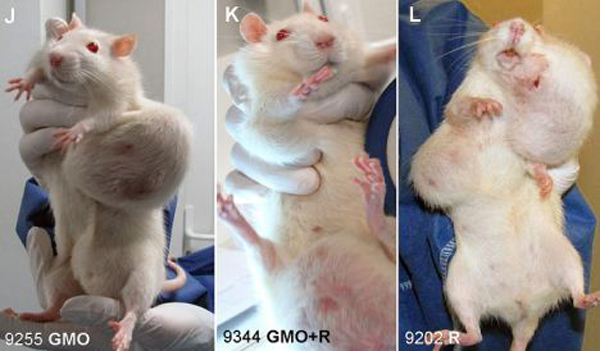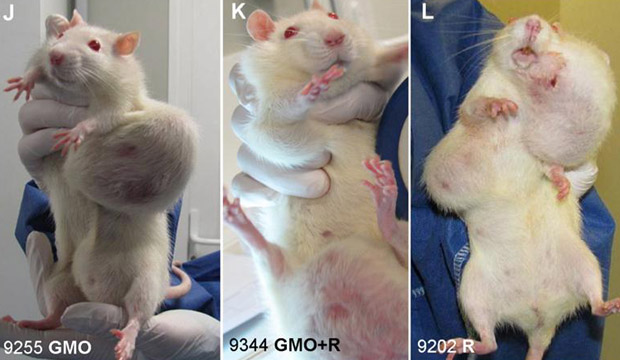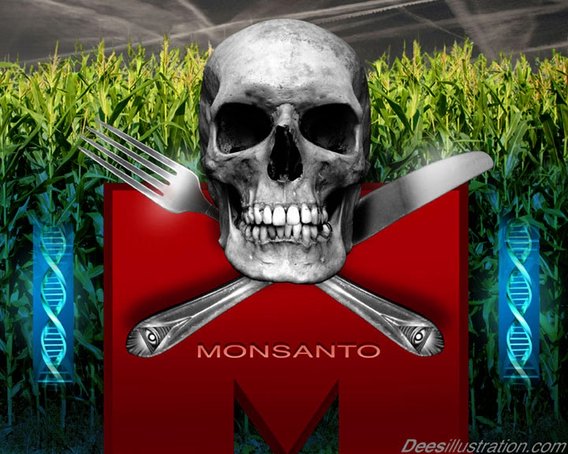Results 11 to 20 of 39
Thread Information
Users Browsing this Thread
There are currently 1 users browsing this thread. (0 members and 1 guests)
-
10-11-2012, 10:53 PM #11Senior Member


- Join Date
- May 2007
- Location
- South West Florida (Behind friendly lines but still in Occupied Territory)
- Posts
- 117,696
Just Label It - the GMO labeling song by Mike Adams, the Health Ranger
Why We Should Label GMO Foods - Washington's BlogJoin our efforts to Secure America's Borders and End Illegal Immigration by Joining ALIPAC's E-Mail Alerts network (CLICK HERE)
-
10-12-2012, 01:29 AM #12Senior Member


- Join Date
- May 2007
- Location
- South West Florida (Behind friendly lines but still in Occupied Territory)
- Posts
- 117,696
Portland Fluoride Issue is Going to a Public Vote!
Today is a great day for our city! We needed 19,858 signatures to bring the city counsel's fluoridation mandate to a pubic vote. We ended up getting 43,236, and they were delivered one day ahead of the deadline!
More: Local events in Portland, OR - OregonLive.com
Join our efforts to Secure America's Borders and End Illegal Immigration by Joining ALIPAC's E-Mail Alerts network (CLICK HERE)
-
10-15-2012, 06:11 PM #13Senior Member


- Join Date
- May 2007
- Location
- South West Florida (Behind friendly lines but still in Occupied Territory)
- Posts
- 117,696
 Russia bans all GM corn imports; EU may also ban Monsanto GMO in wake of shocking cancer findings
Russia bans all GM corn imports; EU may also ban Monsanto GMO in wake of shocking cancer findings
 Wednesday, September 26, 2012
Wednesday, September 26, 2012
by Mike Adams, the Health Ranger
Editor of NaturalNews.com (See all articles...)
(NaturalNews) Russia has now officially banned all imports of genetically modified corn, citing concerns from a recent study by French researchers showing rats grew massive cancer tumors when fed a lifetime of Monsanto's genetically modified corn.
Russia's consumer protection group, Rospotrebnadzor, said it was halting all imports of GM corn while the country's Institute of Nutrition will be evaluating the results of the study.
The Russian ban is the latest blow to Monsanto, a company desperately clinging to the myth that its genetically modified crops are "no different" than traditional crops and therefore long-term safety testing is completely unnecessary. Monsanto has assaulted the French study, claiming it did not use enough rats and that the duration of the study was too short -- an absurd claim, given that Monsanto's own studies on animals are only 90 days in duration, while the French study looked at the effects of rats eating GM corn (and drinking trace levels of Roundup herbicide) for two years.
Notably, the large cancer tumors did not begin to appear until after the rats reached adulthood. Monsanto's GM corn has been in the U.S. food supply for more than a decade, and its corn is found in many popular breakfast cereals.
A European ban, too?
In addition to the Russian ban, Monsanto may also soon be facing a European ban. France is reported asking for a European-wide ban on GM corn if its national health agency confirms the findings of French scientists.
On top of that, if Proposition 37 passes in California, food producers will be required to label GMO on foods sold in that state. This is widely expected to cause U.S. food producers to abandon to use of GMO in foods, since virtually all consumers who know anything about GMO would refuse to buy items labeled as containing genetically engineered ingredients.
Toxicity of GMO now scientifically established
CRIIGEN.org has issued a statement summarizing its findings of the recent rat study, saying:
The implications are extremely serious. They demonstrate the toxicity, both of a GMO with the most widely spread transgenic character and of the most widely used herbicide, even when ingested at extremely low levels, (corresponding to those found in surface or tap water). In addition, these results call into question the adequacy of the current regulatory process, used throughout the world by agencies involved in the assessment of health, food and chemicals, and industries seeking commercialization of products.
Here's one of the photos released by researchers in the recent study, demonstrating the massive cancer tumors found in rats who were fed GM corn:

Government regulators have been infiltrated by Monsanto; scientists bought off
In truth, Monsanto has managed to influence food regulators all around the world. It has paid money to numerous scientists in the USA, and it has essentially "placed" GMO-pushing individuals such as Michael Taylor into influential positions in government.
The European Union's Food Safety Agency (FSA) is also staffed by decision makers with financial ties to genetic engineering seed companies.
Rep. Dennis Kucinich has called for a national GMO labeling law. He says: "The FDA has received over a million comments from citizens demanding labeling of GMOs. Ninety percent of Americans agree. So, why no labeling? I'll give you one reason: The influence and the corruption of the political process by Monsanto. Monsanto has been a prime mover in GMO technology, a multi-million dollar GMO lobby here and a major political contributor."
Video here:
Sources for this story include:
FoxBusiness.com' http://www.foxbusiness.com/news/2012...ussia-suspends
Last edited by AirborneSapper7; 10-17-2012 at 12:21 AM.
Join our efforts to Secure America's Borders and End Illegal Immigration by Joining ALIPAC's E-Mail Alerts network (CLICK HERE)
-
10-17-2012, 12:20 AM #14Senior Member


- Join Date
- May 2007
- Location
- South West Florida (Behind friendly lines but still in Occupied Territory)
- Posts
- 117,696
Join our efforts to Secure America's Borders and End Illegal Immigration by Joining ALIPAC's E-Mail Alerts network (CLICK HERE)
-
10-17-2012, 08:52 PM #15Senior Member


- Join Date
- May 2007
- Location
- South West Florida (Behind friendly lines but still in Occupied Territory)
- Posts
- 117,696

SOURCE UNKNOWNJoin our efforts to Secure America's Borders and End Illegal Immigration by Joining ALIPAC's E-Mail Alerts network (CLICK HERE)
-
10-17-2012, 10:57 PM #16Senior Member


- Join Date
- May 2007
- Location
- South West Florida (Behind friendly lines but still in Occupied Territory)
- Posts
- 117,696
October 16, 2012
California Prop 37 GMO labelling Turns into Major Fight
Corporations opposed to California's Prop 37 which requires labelling of GMO ingredients in food products have donated more than $34 Million to defeat the measure which could have nationwide implications in terms of food labelling and packaging.
According to KCET's election 2012 site and other sources the companies/grups leading the charge in favor of Prop 37 are
- Consumers Union
- Sierra Club
- Organic Consumers Fund
- Dr. Bronner's Magic Soaps
- Nature's Path Foods
- Lundberg Family Farms
And those most strongly against it are:
- Monsanto donated over $7million to fight
- DuPont
- BASF
- DOW
- Council for Biotechnology Information
- Grocery Manufacturers Association
- PepsiCo
- Coca-Cola
- Kellogg Company
More info is available from the Cornucopia Institute
Sustainable is Good | Where design, lifestyle and packaging meet : California Prop 37 GMO labelling Turns into Major FightJoin our efforts to Secure America's Borders and End Illegal Immigration by Joining ALIPAC's E-Mail Alerts network (CLICK HERE)
-
10-20-2012, 11:33 AM #17Senior Member


- Join Date
- May 2007
- Location
- South West Florida (Behind friendly lines but still in Occupied Territory)
- Posts
- 117,696
Monsanto’s New Slogan: Our Corn Won’t Give You Cancer!
by Rick Banfield
01Oct2012
By coto2admin

Keith Kloor, writing at Slate, jumped in to try to stop the tidal wave of negative publicity about Monsanto set off by major study in France by Dr. Gilles-Eric Seralini, proving Monsanto’s corn causes cancers and rapid death. But Kloor made things 1000 times worse.
In his article “GMO Opponents Are the Climate Skeptics of the Left,” Kloor goes through all kinds of breath-taking, logic-defying contortions to try to convince the left, somehow, that GMO-opponents aren’t …. themselves.
Doesn’t he know the whole left detests Monsanto and what they are doing to corrupt food and democracies around the world, and there is no division about it? While he made a stab at creating a internecine battle between left and left, it was a hopeless (albeit perhaps very well-paid) task.
And the reality is there is not only unity between lefties about Monsanto.
The entire left abhors Monsanto. But the right does, too, including climate skeptics. Also the middle detests them. Also, non-political people. Also anarchists. Also militias. Also sewing circles. Even family pets can’t stand them. Monsanto has been a gift to everyone in that way, bringing the whole country together as one big ticked off family.
Kloor failed in his impossible effort to divide the undividable. But he came up a winner with his subtitle, which gives Monsanto a fabulous food slogan.
“Don’t worry. Genetically modified corn isn’t going to give you cancer.”
Kloor may not be very savvy politically but he is a PR whiz. “Monsanto’s GM-corn doesn’t cause cancer!” is even catchier than “pink slime,” which has caught hold like glue with the public.
It’s a great slogan and Monsanto could even put the images of the rats in Seralini’s study on packages containing their GM-corn and say “See, no cancer!”

Or maybe Monsanto might prefer a more general slogan “Buy our food, it won’t kill you!” and apply it to all their products. Then they could use the rat’s photos and to proclaim, “See, they’re not dead!”

People would be rushing out for Monsanto’s GM-corn, GM-soy, GM-canola, GM-sugar, GM-high-fructose-GM-corn-syrup, GM-papaya, GM-crook-neck squash, GM-Nutrasweet, GM-Equal, etc.In his article, Kloor tore into Professor Seralini, but didn’t bother to mention that Professor Seralini had already had to go to court to stop defamation, and he won. That being the case, Kloor might like to go after other scientists who are also saying there are dire consequences to GMOs. The latest warnings are about GM-wheat which is proving itself as much of a winner as GM-corn. Parents who eat GM-wheat could have children who diefrom it by the age of 5. Perhaps Kloor’s slogan for GM wheat could be “GM-wheat doesn’t kill your children!”
But that’s jumping ahead. One catchy phrase at a time.
Thanks to Keith Kloor, left and right have been brought together and Monsanto now has an unforgettable advertising slogan.
Monsanto’s New Slogan: Our Corn Won’t Give You Cancer! by Rick Banfield | Food Freedom News.
October 20th, 2012
The Progressive Mind » MonsantoLast edited by AirborneSapper7; 10-20-2012 at 11:38 AM.
Join our efforts to Secure America's Borders and End Illegal Immigration by Joining ALIPAC's E-Mail Alerts network (CLICK HERE)
-
10-21-2012, 01:29 AM #18Senior Member


- Join Date
- May 2007
- Location
- South West Florida (Behind friendly lines but still in Occupied Territory)
- Posts
- 117,696
 Join our efforts to Secure America's Borders and End Illegal Immigration by Joining ALIPAC's E-Mail Alerts network (CLICK HERE)
Join our efforts to Secure America's Borders and End Illegal Immigration by Joining ALIPAC's E-Mail Alerts network (CLICK HERE)
-
10-23-2012, 10:37 PM #19Senior Member


- Join Date
- May 2007
- Location
- South West Florida (Behind friendly lines but still in Occupied Territory)
- Posts
- 117,696
Good crop, bad crop: French scientists dismiss Monsanto 'cancer corn' study
Published: 23 October, 2012, 04:05
Edited: 23 October, 2012, 18:25
 NK 603: The corn cob of contention (AFP Photo/Philippe Huguen)
NK 603: The corn cob of contention (AFP Photo/Philippe Huguen)
Six leading French academies have condemned last month’s controversial study that linked genetically-modified corn and weedkiller produced by agri-giant Monsanto with cancer. The verdict was backed by two government-commissioned scientific reviews.
The national academies of agriculture, medicine, pharmacy, sciences, technology and veterinary studies issued a joint statement condemning the findings on Monsanto’s NK603 corn, which were published last month by molecular biologist Gilles-Eric Séralini of the University of Caen.
"Given the numerous gaps in methods and interpretation, the data presented in this article cannot challenge previous studies which have concluded that NK603 corn is harmless from the health point of view, s are, more generally, genetically modified plants that have been authorised for consumption by animals and humans,” the statement read.
Séralini, a longtime and vocal opponent of genetically-modified crops, tested several groups of rats by feeding them Monsanto’s NK603 corn, which was genetically modified to be resistant to Roundup, a popular pesticide also sold by the US company. The study lasted for two years and showed how rats that ate NK603, both untreated and treated with Roundup, developed cancer at higher rates than the control group.
NK603 was approved for sale in the EU in 2003, but is not grown on a commercial scale. (France outlawed the cultivation of genetically modified [GM] crops.) Most of the modified corn reaches the food chain as livestock feed imported from major producers abroad.
Séralini’s study – whose findings contradicted dozens of previous safety reviews – made its way to the front pages of European newspapers. The report sparked widespread calls for a Europe-wide ban on GM foods, which are already subject to severe restrictions.
In their statement, the academies questioned Séralini’s integrity. His study, co-authored with Dr. Spiroux, a homeopathy and acupuncture specialist, was largely financed by anti-GM activists and organic food supermarkets. The findings were then disseminated through a group of handpicked sympathetic journalists, who signed a confidentiality clause forbidding them to show the paper to other scientists prior to publication.

On the defensive. Gilles-Eric Seralini (C) with Dr Joel Spiroux (R) and MEP Corinne Lepage (AFP Photo/Kenzo Tribouillard)
With just a few articles, these journalists set off a media firestorm that renewed concerns about GM foods and forced the mainstream scientific establishment onto the defensive.
"Hyping the reputation of a scientist or a team is a serious misdemeanor when it helps to spread fear among the public that is not based on any firm conclusion,” the academies’ statement said.
A statement last week from the French National Centre for Scientific Research criticized Séralini’s media onslaught on ethical grounds, claiming it misled the public on major and sensitive issues.
The censure was backed by the simultaneous verdicts of the Higher Biotechnologies Council (HCB) and the National Agency for Food Safety (ANSES), two leading government agencies charged with reviewing the concerns raised in Séralini’s study. Both bodies dismissed the report, saying it was not comprehensive enough to be a wholesale review of GM crop suitability.
"The data is insufficient to establish scientifically a causal link… or to support the conclusions or pathways suggested by the authors," ANSES said.
The paper also earned widespread criticism for its methodology. Tom Sanders, head of the nutritional sciences research division at King's College London, saying the study was a “statistical fishing trip,” manipulated from the start to achieve a specific result.
Séralini used Sprague-Dawley rats for the study. This sub-species is highly susceptible to developing tumors, with two-thirds of males and more than half of females expected to die from cancer during the course of a two-year experiment regardless of what they ingested.
This ubiquity of tumors makes them an unusual choice for a study about carcinogenic effects of a certain food, as it can be difficult to discern from an already astronomically high cancer rate. The Organization for Economic Cooperation and Development (OECD) recommends that only rats with a survival rate of more than 50 percent, which are easily available, be used in two-year studies.
The second major criticism of the study was its small sample size. The OECD recommends that 50 rats of each sex be used in any test group. Séralini used test groups of ten, meaning the control group for two years was only twenty rats in total. The difference between the groups fed NK603 corn and the control group was one or two dead rats over a period of two years.
In some cases, the results direct contradicted the study’s claims: some rats subjected to a diet of Roundup corn had a better survival rate over the two-year period than ones fed an organic diet. Rather than believing that drinking water contaminated with pesticides helps to decrease cancer, critics say that in such a small sample size noticeable differences in results can be explained by chance.
Séralini, who has caused several similar controversies with other anti-GM studies since 2004, responded to the criticism by saying he stands by his conclusions. However, he has refused to share the detailed the observation records that formed the foundation of his paper until genetically-modified foods are banned by European authorities.
The rejection of the study’s findings is unlikely to dampen the resolve of other anti-GM advocates.
Michael Antoniou, a molecular geneticist from King’s College London, recently published an extensive review of several hundred previous GM food studies.
He concluded that the technologies used to produce GM foods were imprecise, and despite assurances of total safety, the current licensing mechanisms – even in the EU – are perfunctory, with much research funded by the producers themselves using only short-term studies that gave no insight into the long-term effects. He also noted the lack of large-scale human trials.
Meanwhile, many of the animal studies he listed demonstrated possible adverse effects from GM foods such as liver and kidney toxicity and possible allergenic effects.
Now, despite the recent dismissal of Séralini’s study by authorities in France, Germany, Australia and the European Food Safety Authority, apprehension over these issues in so-called ‘Frankenfoods’ has come back to life in Europeans, a group that has traditionally been staunchly anti-GM.
The latest 2010 ‘Eurobarometer’ survey on the issue showed that 59 percent of all EU citizens believe that genetically modified food is unsafe. Ten percent of the world’s agricultural land is used for GM crops, but only 0.06 percent in Europe.
Following this latest crisis of confidence, HCB and ANSES have called for further follow-up studies into the safety of GM crops.
Igor Ogorodnev, RT
Good crop, bad crop: French scientists dismiss Monsanto 'cancer corn' study — RTLast edited by AirborneSapper7; 10-23-2012 at 10:40 PM.
Join our efforts to Secure America's Borders and End Illegal Immigration by Joining ALIPAC's E-Mail Alerts network (CLICK HERE)
-
10-25-2012, 08:59 AM #20Senior Member


- Join Date
- May 2007
- Location
- South West Florida (Behind friendly lines but still in Occupied Territory)
- Posts
- 117,696
 Join our efforts to Secure America's Borders and End Illegal Immigration by Joining ALIPAC's E-Mail Alerts network (CLICK HERE)
Join our efforts to Secure America's Borders and End Illegal Immigration by Joining ALIPAC's E-Mail Alerts network (CLICK HERE)


 2Likes
2Likes LinkBack URL
LinkBack URL About LinkBacks
About LinkBacks




 Reply With Quote
Reply With Quote


1,300 Migrants swarm NYC’s City Hall over false rumor of green...
04-25-2024, 07:27 AM in General Discussion